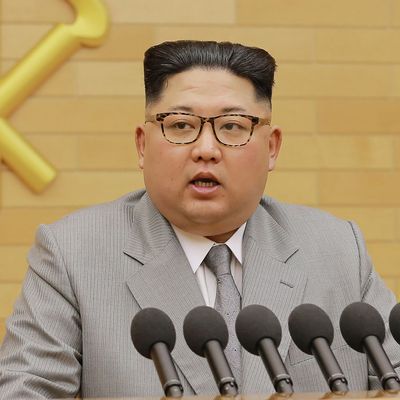
In his annual New Year’s Day address, North Korean dictator Kim Jong-un offered what observers described as a rare olive branch toward his putative archenemies in South Korea, while also warning the U.S. that he was willing and able to attack the U.S. with nuclear weapons in the event of a war.
Expressing hope for a “peaceful resolution” to the longstanding cold war on the peninsula, Kim said the two countries should “work together as a people of the same heritage to find peace and stability,” and offered to begin talks with Seoul “as soon as possible” about sending a North Korean delegation to the upcoming Winter Olympics in Pyeongchang, South Korea. Two North Korean figure skaters qualified to compete in the games and even though their country missed an October 30 deadline to confirm that it would send them, the International Olympic Committee has said it wants North Korea to participate and could still allow them to do so if the Koreas manage to work it out.
For their part, the South Koreans have been eager to obtain assurances from both Pyongyang and Washington that the games in Pyeongchang, a scant 50 miles from the demilitarized zone, won’t be marred by heightened tensions or the outbreak of war. Last month, President Moon Jae-in urged Kim to hold off on testing any more nuclear warheads or ballistic missiles in the lead-up to Pyeongchang and proposed that the next round of South Korean–American military exercises be delayed. On Saturday, North Korea said it had no plans to alter the course of its nuclear-weapons development in the coming year, but Kim’s latest remarks suggest that he may in fact be more receptive to Moon’s proposal than he looks.
In response to the address, Moon’s spokesperson Park Soo-hyun said the South Korean government was likewise eager to improve relations and have the North participate in February’s games, stating: “If the Pyeongchang Olympics can be successfully held as peace Olympics, it will make contributions to the peace and harmony of the Korean Peninsula and Northeast Asia, as well as to the world.”
Lest anyone think the isolated dictator has gone soft, however, Kim also used the speech to brag that North Korea is now capable of hitting the entire U.S. mainland with its nuclear weapons and to warn that “the nuclear button is always on the desk of my office” should the U.S. dare to attack them. Kim’s boast remains, for the moment, just that: North Korea did launch a missile in November with enough range to reach New York, but it was only carrying a dummy payload. It has yet to demonstrate that it can actually deliver a much heavier nuclear warhead at that range.
Nuclear experts, however, believe it is only a matter of time before North Korea gets there, and tensions between Pyongyang and Washington show no signs of subsiding. On Sunday, former chairman of the Joint Chiefs of Staff Admiral Mike Mullen told ABC News that the U.S. was closer than ever before to nuclear war with North Korea. In the meantime, North Korea is also believed to be developing biological weapons and submarine-based missiles and honing its skills at cyber warfare (the U.S. recently accused the regime of being behind the global WannaCry ransomware attack last May).
In that context, there was little in Kim’s speech to suggest that President Donald Trump’s bellicose rhetoric and uncompromising position on North Korea have succeeded at intimidating him into submission, but his combination of nuclear saber-rattling at the U.S. with an overture of reconciliation to South Korea could provide some clues as to Pyongyang’s diplomatic strategy going forward. If the Olympics become a vehicle for rapprochement between the Koreas, and especially if that entails a pause in our war games, Kim may be trying to get the tail to wag the dog, forcing Washington to follow Seoul’s lead into détente. Alternatively, he may see this as an opportunity to drive a wedge between his enemies if South Korea, which has no appetite for war with the North, attempts to make a deal that the Trump administration won’t support.
Or perhaps Kim is simply looking to pursue détente with the South and deterrence of the U.S. on separate tracks. Making gestures of peace and reconciliation while continuing to develop his nuclear capabilities would support Kim’s narrative that the North Korean nuclear program is solely a deterrent to American aggression; as Tong Zhao, a fellow at the Carnegie-Tsinghua Center in Beijing, explained to CNN, Kim is chiefly concerned with persuading the international community that his nukes are defensive and securing an agreement that lets him keep them. If Kim can make it through 2018 without being annihilated in a war with the U.S. or somehow forced to relinquish his WMDs, North Korea will likely become a full-fledged nuclear-weapons state sometime this year, with all the deterrent capability and geopolitical clout that entails.
The sticking point, of course, is that North Korea’s neighbors are none too keen on letting that happen, while the U.S. is dead set against any deal that doesn’t dismantle (or at very least freeze) Pyongyang’s nuclear program. Indeed, Trump has been hot and cold as to whether he’s willing to negotiate with North Korea at all. Eventually, something’s gotta give. If Kim thinks he can delay talks over his nuclear ambitions until it is too late to stop them, he may find that the Trump administration is more willing than he thinks it is to go to war. In that case, 2018 will be a very, very bad year for both North and South Korea.





























